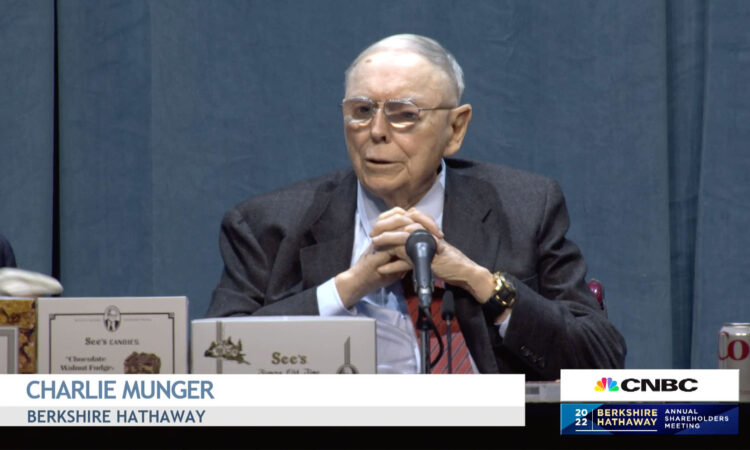
- Berkshire Hathaway Vice Chairman Charlie Munger urged the U.S. government to ban cryptocurrencies, as China has done.
- “A cryptocurrency is not a currency, not a commodity, and not a security,” the 99-year-old Munger said in an op-ed published in The Wall Street Journal Thursday.
- Munger and his business partner Warren Buffett are longtime cryptocurrency skeptics, contending they are not tangible or productive assets.
Charlie Munger at the Berkshire Hathaway press conference, April 30, 2022.
CNBC
Berkshire Hathaway Vice Chairman Charlie Munger urged the U.S. government to ban cryptocurrencies, as China has done, arguing that a lack of regulation enabled wretched excess and a gambling mentality.
“A cryptocurrency is not a currency, not a commodity, and not a security,” the 99-year-old Munger said in an op-ed published in The Wall Street Journal Thursday.
“Instead, it’s a gambling contract with a nearly 100% edge for the house, entered into in a country where gambling contracts are traditionally regulated only by states that compete in laxity,” Munger said. “Obviously the U.S. should now enact a new federal law that prevents this from happening.”
Munger and his business partner Warren Buffett are longtime cryptocurrency skeptics, contending they are not tangible or productive assets. Munger’s latest comments came as the crypto industry was plagued with problems from failed projects to a liquidity crunch, exacerbated by the fall of FTX, once one of the world’s largest exchanges.
The cryptocurrency market lost more than $2 trillion in value last year. The price of bitcoin, the world’s largest cryptocurrency, plunged 65% in 2022 and it has rebounded about 40% to trade around $23,824, according to Coin Metrics.
The renowned investor said in recent years privately owned companies have issued thousands of new cryptocurrencies, and they have become publicly traded without any governmental preapproval of disclosures. Some have been sold to a promoter for almost nothing, after which the public buys in at much higher prices without fully understanding the “pre-dilution in favor of the promoter,” Munger said.
He listed two “interesting precedents” that may guide the U.S. into sound action. First, China has strictly prohibited services offering trading, order matching, token issuance and derivatives for virtual currencies. Second, from the early 1700s, the English Parliament banned all public trading in new common stocks and kept this ban in place for about 100 years, Munger said.
“What should the U.S. do after a ban of cryptocurrencies is in place? Well, one more action might make sense: Thank the Chinese communist leader for his splendid example of uncommon sense,” Munger said.
(Read the full piece in the Journal here.)






